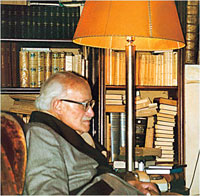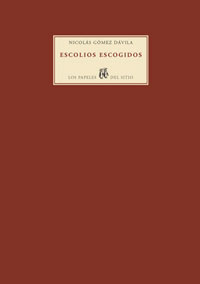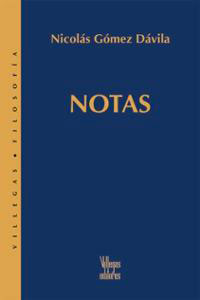



Nicolás Gómez Dávila
Bogotá 1913 - 1994
Colombian philosopher and moralist who developed out of university and relatively late a work mostly fragmentary in the form of aphorisms that he preferred to give the name of “scholia” (escolios). Some have not hesitated to present him as a “Colombian Nietzsche” although his religious thought constantly refers to the Tridentine Catholicism. His fascination with the ancient Greco-Roman and Germanic Middle Ages, its aristocratic philosophy and scathing critique of modernity, however, could in fact be closer to the hermit of Sils-Maria. Often labeled as a conservative thinker or “ultra-conservative”, because of its antidemocratic thought, he preferred to call himself “authentic reactionary” totally alien to his time. Son of good Colombian family, at theage of six he moved to Paris with his parents enrolled him in a Benedictine college. During his adolescence he suffered severe pneumonia that confined him to bed for two years, time during which he must follow the course of tutors and take the opportunity to deepen his Greek and Latin. At 23, he returned to Colombia and marries Emilia Ramos Nietos. He will recross the Atlantic only in 1948 to make a tour of Europe by car for six months with his wife. Then, he basically dedicate its library will reach nearly 30,000 volumes, reflection and writing on accounting records in the manner of Lichtenberg’s Sudelbücher. “His library was his world” could tell his daughter Rosa Emila. “When he fell sick, we down his bed in the library. He died among his books”. Main works: Notas (Mexico, 1954, republication Bogotá, Villegas 200), Textos (Mexico, 1959, republication Bogotá, Villegas 200) and Escolios a un texto implícito, 2 volumes (Bogotá, 1977), Nuevos escolios a un texto implícito, 2 volumes (Bogotá, 1986), Succesivos escolios a un texto implícito (Bogotá, 1992, Bogotá, Villegas, 2005).
Bibliography: Abad Torres Alfredo, Pensar lo implícito: en torno a Gómez Dávila, Pereira, CRIE, 2008 ; « Nicolás Gómez Dávila : Crítica e Interpretación », Paradoxa, n. 14, Universidad Tecnológica de Pereira, 2007 ; Studia daviliana : études sur Nicolás Gómez Dávila, réunies par Philippe Billé, La Croix Comtesse, automne 2003 ; Gómez Rosa Emilia, « Entrevista », El Tiempo, Bogotá, 04/03/2006.